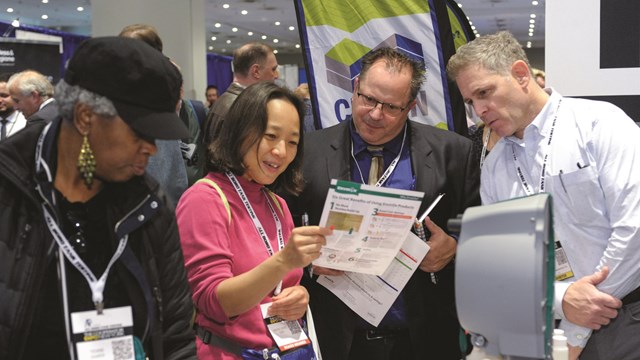When it comes to offering social programs and amenities, respective requests, needs, and preferences can run the gamut. For board members and managers, having programs in place that cater to collective populations—toddlers to octogenarians and all those in between (and beyond)—can be a quite a challenge.
“A community that has activities and opportunities to get together creates a much stronger sense of belonging and a much more positive atmosphere,” says Attorney Ellen Hirsch de Haan, who practices in Florida but has over 28 years of experience in the practice of HOA and condo law. “They have fewer disagreements, less challenges with the board, and more cooperation with the operations and governance of the community.”
A 2010 recipient of the Community Association Institution Award by the National Board of Certification for Community Association Managers, de Haan has penned three books about the subject including Boomer Shock: Preparing Communities for the Retirement Generation, Self-Management: A Guide for the Small Community Association, and A Place to Age. Earlier this year, she served as featured presenter at Community Associations Institute Community Association Law Seminar in San Francisco.
“You find that, across the country— depending on where you are—you are going to have a different type of culture, and possibly a totally different demographic mix,” says de Haan. “The Chicago area, for example, is very urbanized so will have a different way of doing things than a community in Texas or Tampa. Housing stock matters; geographic location matters, and cultural and demographic backgrounds, and—of course—age matters.”
Typically, a wide range of residents populate condos and co-ops; therefore, board members, social committees, and managers have to work in a collaborative fashion to ensure all residential requests are considered. Most likely, a young married couple raising children, for instance, will have different needs—like playrooms and day care services—than a retired couple who may prefer game nights and visits to museums.
“My onsite community of active adults has quite a full calendar of social and recreational programs…monthly luncheons, movie nights, pot luck dinners, and exercise classes,” says Deb Schmelzel, property manager at the Aurora-based Baum Property Management, AAMC. “Card games are a big hit, such as hand and foot (a version of canasta), bridge, Mahjong, and bunco.
Summertime is full with beanbags, bocce ball, and tennis. Outings to shopping centers and ballgames are also planned, she says.
William Samatas, CMCA, property manager, and managing broker for Elmwood Park-based Cortland Properties, notes that only a handful of his firm’s clients have amenities such as pools, exercise rooms, and hospitality or party rooms. As a result, there aren’t many social activities planned currently; though, that may change shortly, he says.
“At one high-rise we manage, we have thought about alternate uses of the hospitality room. Aside from residents using the room for parties, we have also had business seminars and free flu vaccination clinics,” says Samatas.
Communication is King
For most properties, technology has had an impact on certain aspects of this subject. For instance, in recent years, the once customary place to share news and information—the bulletin board—has morphed to a more virtual experience. While older residents still prefer cork boards and pinned flyers, this method of communication is fast disappearing.
Many boards and property managers use websites—such as BuildingLink—to communicate, which serves 984,510 residents, 46,623 property managers and staff in 2,615 buildings worldwide and serves as a paperless portal for news, information, and community chatter.
However, certain associations are considered troglodytes, or not ready (or willing) to adopt new communication practices. “Many associations are very slow to embrace new technologies,” says de Haan. “Many will use e-mail but I can’t even get my clients to Skype…and this isn’t a new technology. I’m either on conference calls with them or visiting them in person.”
For many associations, the best communication takes place during scheduled meetings in which residents, board members and managers interact in person. “Board meetings are the best way to communicate…or sending out a survey,” says Schmelzel, who manages eight communities of varying types. “If the association has a website, e-mail blasts to all owners on the site is a great way to get community opinion and ideas.”
To Schmelzel’s point, many boards and managers will execute both formal and informal polling to get a better understanding of what programs will be successful. In many cases, this requires the formation of an activities committee. For communities with wide age ranges, de Haan claims this approach is especially important as program needs change quickly. While social media assists with communication—from alerts about bad weather to reminders about holiday parties—sometimes, quite simply, the best way to understand resident needs is to listen.
“There are surveys and the occasional town hall meeting so you can get various inputs from the people in the community. Achieving a sense of a community—the more you are interacting,” says de Haan. “It’s an educational process, particularly as we get more intergenerational residents.”
For teens, single adults, and families, classes like Zumba, Pilates, kickboxing, spinning, sculpting, high intensity interval training, yoga, and yoga barre are becoming popular. “The older baby boomers are very big into book clubs, travel clubs, poker games, bridge games, shuffleboard, bocce, and tennis courts. Younger boomers look for fitness centers and pools and clubhouses for functions like a movie night or special event like the Super Bowl,” says de Haan. “For families, they are usually far more interested in having a playground built than a Super Bowl party.”
The Bottom Line
While the majority of properties managed have a budget line for social activities, depending on the property, a budget can range from an annual holiday party to numerous parties and social outings such as museums and the like. “I don’t have much experience with the budgeting aspect,” says Schmelzel. “At my property, they found that charging the homeowners for the outings and classes was a better way to take care of this issue. Not all owners participate so to budget for these type events did not seem fair to all the owners.”
For retirement communities, recreational budgets can become a sticky issue. To this end, each will take a different approach to how they budget. In some cases, it may be a combination of allocated money from the board along with fellow residents banding together to create shared experiences.
“If it’s a retirement community, you may have a lot of people on fixed incomes,” says de Haan. “Older people don’t like to pay into reserves because they feel they might not be around to use the funds, so they want to pay less money each month. Younger people just starting out with families don’t have as much income or extra money to spend, so between these two variables, budgets are always an issue.”
In some cases, Schmelzel and de Haan say that associations will charge a fee for the event via a ticketing process. Often, this will cover the cost of food and soft drinks; this way, the board doesn’t have to allocate funds. “The cost for many of these events is reasonable, and sometimes it’s a pot luck event,” says de Haan. “If, at the end of the year, the board had extra money, they might be able to afford to host a holiday party.”
Creating Meaningful Experiences
While most communities can expect a holiday party—and perhaps a summer barbeque each year, as units change hands and residents get older, needs and wants also change. As a result, if a yoga program worked two years ago, it may not work two years later. As boards, managers, and social committees determine residential needs, they have to continually adapt to changing circumstances. In many cases, this requires creative thinking.
“Most of the activities are planned by the owners if they have an interest in some activity they can bring it to the community. We also plan for informative seminars…elder law, insurance coverage for over 65, travel tips, and information,” says Schmelzel. “The property I manage does not allow children so this would only be for the adult community.”
Schmelzel continues: “I have a small condo that is attempting to have community picnics. This will be the first year as they just opened a recreation area that will have grills and some games for the owners family’s to use. We are hopeful the community will use and enjoy the area.”
As de Haan points out, with communication and shared willingness to affect change, residents can and do come together to make their community different. While these are positive experiences, new board members and younger managing agents also have to keep a mindful eye on any liabilities that can result from an activity—whether a physical activity like landscaping or a social gathering such as a party.
According to Schmelzel, most often, the majority of communities with social activities are a joint effort shared between a social committee and a manager. Where liability plays a significant role is when residents’ age impacts mobility and participation. As a result, de Haan sees the role of the association manager changing in many cases as they are not educated to meet the demands or responsibilities of an aging community.
“Community association managers are being called upon to deal with things that they do not have the expertise for unless they have a masters or PhD in social work or psychiatry. New forms of education will be needed for managers,” says de Haan. “There are liability issues as well with aging. The association is not a hospital or an assisted living facility, and many managers are called upon to deal with some extremely difficult situations.”
W.B. King is a freelance writer and a frequent contributor to The Chicagoland Cooperator.





Leave a Comment